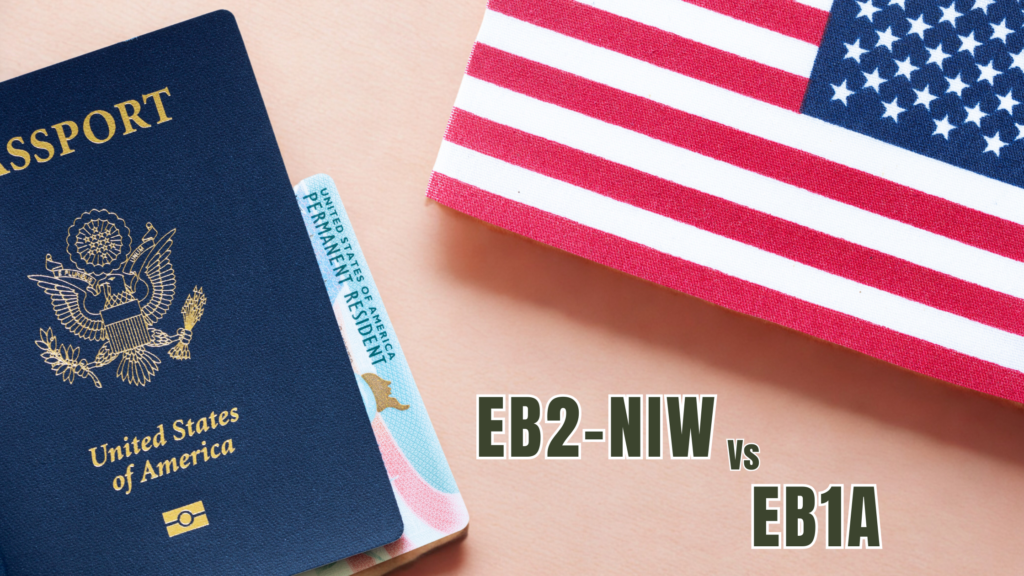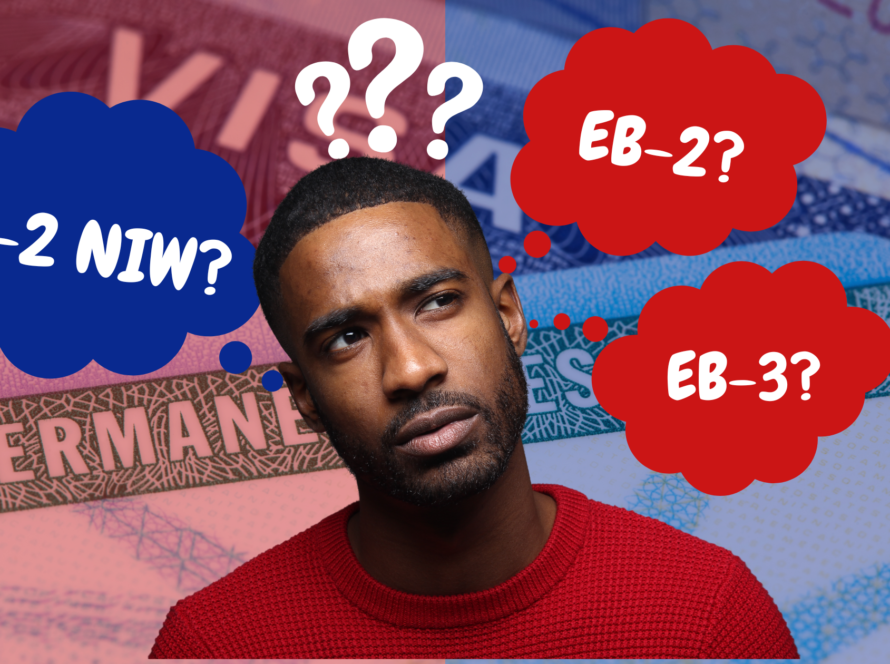
Immigrating to the United States as a highly skilled professional is a dream shared by many, but the path to achieving this dream is anything but one-size-fits-all. When it comes to choosing between EB2 NIW (National Interest Waiver) and EB1A (Extraordinary Ability), the stakes are high—and the right choice can save years of time, thousands of dollars, and even potential heartache.
Both categories provide permanent residency without employer sponsorship, but they serve different types of professionals and follow distinct legal standards. While EB2 NIW is tailored for those who can demonstrate their work benefits the U.S. on a national scale, EB1A rewards individuals with documented proof of outstanding achievements in their field. So, how do you decide which green card route is right for you? That’s what we’ll explore in this comprehensive guide.
Understanding the EB2 NIW Category
The EB2 National Interest Waiver is a subsection of the broader EB2 category for professionals holding advanced degrees or possessing exceptional ability. However, what sets NIW apart is the waiver of the labor certification process and job offer—provided the applicant proves their work is in the “national interest” of the United States. Think researchers, engineers, physicians, and policy experts—individuals whose work might not win international awards but plays a vital role in the U.S. economy, health, environment, or technological innovation.
Understanding the EB1A Category
The EB1A is part of the first preference category, reserved for individuals who can prove “extraordinary ability” in sciences, arts, education, business, or athletics. It’s for those who stand at the very top of their field—those who have received major international awards, published widely, or contributed original work of major significance.What makes this category appealing? No job offer or labor certification is needed, and due to its first preference status, it typically faces shorter visa wait times, even for countries with high demand like India or China.
What Does “National Interest” Mean in EB2 NIW?
To qualify under EB2 NIW, the applicant must meet a three-prong test:
- Their proposed endeavor has substantial merit and national importance.
- They are well-positioned to advance the proposed endeavor.
- Waiving the labor certification would benefit the U.S. more than requiring it.
While this doesn’t mean you need to be a Nobel laureate, you do need a compelling case—including evidence like publications, government funding, recommendation letters, and a strong personal statement.
What Constitutes Extraordinary Ability in EB1A?
USCIS lays out ten criteria for EB1A, and you must meet at least three—or win a one-time, major international award (like a Pulitzer, Oscar, or Olympic medal). These criteria range from original contributions of significance to your field to published work about you, media appearances, and high salaries.
In short, extraordinary ability isn’t just about being talented; it’s about being widely recognized for that talent.
Academic vs Professional Pathways
EB2 NIW tends to suit academics, researchers, public health professionals, and policy specialists. It’s common among PhD holders, postdocs, and those working in national labs or NGOs.EB1A is more suitable for globally known individuals—top-tier researchers with a high h-index, elite athletes, renowned artists, and entrepreneurs with massive traction.
The Role of Advanced Degrees in EB2 NIW
An advanced degree (master’s or higher) or a bachelor’s degree with five years of progressive experience is generally required. Your education should directly support the proposed endeavor, and USCIS expects to see how your academic background makes you a strong candidate.
The Role of Awards and Recognition in EB1A
Awards are not optional in EB1A. The prestige of your awards matters immensely—local or unknown honors won’t cut it. Think “international,” “national,” and “industry-recognized.”
Even then, your evidence must be contextualized. USCIS wants to know how competitive the award was, who grants it, and what it says about your stature in the field.
Does EB2 NIW Require a Job Offer?
No—but your plan must demonstrate long-term goals in the U.S. You must clearly define your endeavor, show how it aligns with national goals, and prove that you don’t need a specific job to carry it out.
A robust personal plan, even without employer sponsorship, is a must.
Does EB2 NIW Require a Job Offer?
No—but your plan must demonstrate long-term goals in the U.S. You must clearly define your endeavor, show how it aligns with national goals, and prove that you don’t need a specific job to carry it out.A robust personal plan, even without employer sponsorship, is a must.
Does EB1A Require Employer Sponsorship?
Absolutely not. In fact, EB1A is a self-petition category, empowering individuals to pursue a green card without relying on anyone. It’s ideal for entrepreneurs and freelancers who work across multiple projects or have their own ventures.
EB2 NIW Processing Time
Processing time can range from 12 to 18 months, but delays are common, especially if you receive a Request for Evidence (RFE).
EB1A Processing Time
Thanks to premium processing, EB1A can be approved within 15 calendar days. This speed makes it attractive to highly qualified individuals who need fast decisions for career or visa planning.
Premium Processing for EB1A and EB2 NIW
EB1A is eligible for premium processing at an additional cost, offering a quick response. Premium processing is also available for EB2-NIW.
Green Card Backlogs by Country of Birth
EB1A often has current priority dates, while EB2 NIW suffers from significant backlogs, especially for Indian and Chinese nationals. This makes EB1A a strategic choice if you’re from a high-demand country and qualify.
USCIS Adjudication Standards: EB2 NIW vs EB1A
While EB1A demands higher evidence, it also has more predictable adjudication standards. EB2 NIW, however, has more subjective criteria, and outcomes can vary based on how convincingly your case is argued.
📌 Real-Life EB2 NIW Success: Humanities Ph.D. Approved in 3 Months
Meet Bimpe, a Ph.D. candidate in the humanities who secured EB2 NIW approval in just 3 months—without a STEM background or employer sponsorship.
His proposed endeavor in language learning and revitalization aligned with national interests in education, cultural preservation, and minority inclusion. Backed by a Fulbright Scholarship, two book chapters, and strong letters from independent experts.🎥 Watch his full success story here: Ph.D. in Humanities Gets EB2 NIW in 3 Months
📌 Real-Life EB1A Success: From Application to Approval in Under 3 Months
In a powerful interview Dr. Cesar Escalante shares how he achieved U.S. permanent residency through the EB1A category in less than three months.
Interviewed by consultant Olanike, Dr. Escalante explains why he chose EB1A over EB2 NIW. If you’re considering the EB1A green card route and want a real-world example of how it’s done, this story is a must-watch.🎥 Watch the full interview here: How Dr. Escalante Got EB1A Approval in 3 Months
The Role of Recommendation Letters
For both categories, quality trumps quantity. Letters from U.S. government officials, leading academics, or Fortune 500 executives hold more weight than a stack of form letters from coworkers.
How to Present a Strong Case for EB2 NIW
- Start with a strong personal plan
- Include government impact evidence
- Use objective metrics: citations, funding, media, etc.
How to Present a Strong Case for EB1A
- Organize by USCIS criteria
- Provide context for every achievement
- Support claims with evidence of recognition
Top Mistakes in EB2 NIW Applications
- Vague national interest claims
- Weak letters of recommendation
- Failing to show “well-positioned” evidence
Top Mistakes in EB1A Applications
- Submitting awards without context
- Overstating achievements without proof
- Using outdated or weak evidence
Costs Associated with EB2 NIW
- Adjustment Of Status or Consular Processing, depending on whether they live in the United States or outside the United States.
- USCIS filing fees: ~$715 Applicants must also pay $300 asylum program fee.
- Medicals, biometrics, etc.: ~$400–$600
- Attorney fees: $3,000–$7,000 (Premium processing fee also applies. However premium processing is optional.
Costs Associated with EB2 NIW
- Adjustment Of Status or Consular Processing, depending on whether they live in the United States or outside the United States.
- USCIS filing fees: ~$715 Applicants must also pay $300 asylum program fee.
- Medicals, biometrics, etc.: ~$400–$600
- Attorney fees: $3,000–$7,000 (Premium processing fee also applies. However premium processing is optional.
Costs Associated with EB1A
- Similar to EB2 NIW but $300 asylum program fee. Premium processing fee (~$2,805)is optional
- Higher prep cost if gathering elite evidence
Which Path is Better for Entrepreneurs?
EB1A shines for high-growth entrepreneurs with VC funding or public accolades. EB2 NIW works well for impact-driven founders (e.g., social entrepreneurs).
Which Path is Better for Researchers and Scientists?
EB2 NIW favors those with policy or health impact, while EB1A suits top-publishing academics and patent holders.
Which Path is Better for Researchers and Scientists?
EB2 NIW vs EB1A: Which One is Right for You?
- You have strong public benefit work
- You lack major awards but have consistent contributions
Choose EB1A if:
- You have top-level international recognition
- You want speed and fewer backlogs
Conclusion: EB2 NIW Vs EB1A Simplified
Both EB2 NIW and EB1A offer exciting pathways to permanent residency, each with its unique advantages and requirements. Whether you’re a quiet genius driving policy behind the scenes or a world-renowned innovator, there’s a path for you. The key is knowing your strengths, preparing your documentation meticulously, and making the choice that aligns best with your goals.
Frequently Asked Questions
Can I apply for both EB2 NIW and EB1A at the same time?
Yes, dual filing is allowed and can improve your chances.
Is EB1A harder than EB2 NIW?
Generally, yes—because EB1A requires a higher level of proof and international acclaim.
Can I switch from EB2 NIW to EB1A?
Yes, if your credentials improve and you meet the EB1A criteria.
How long does EB1A take to process?
With premium processing, approvals can arrive within 15 days.
Can EB2 NIW be denied even with strong evidence?
Yes, due to subjective evaluation by USCIS officers. Legal strategy matters.
Which category is better for startup founders?
EB1A for high-visibility founders, EB2 NIW for impact-focused innovators.
Take the Next Step in Your EB-2 NIW Journey
Don’t navigate this complex process alone. My Green Card Story is here to help you every step of the way. From gathering essential documents to handling RFEs and assembling a compelling petition, our expert consultants specialize in EB-2 NIW applications.
✅ Book a personalized consultation today!
✅ Get expert guidance tailored to your unique case.
✅ Accelerate your path to U.S. permanent residency.
Click here to schedule your consultation now!
For official information on the EB-2 and NIW process, visit the USCIS website.
Let’s make Your EB2 journey a success! Stay connected with us! Follow My Green Card Story on all our socials for the latest updates, tips, and inspiring success stories. Got questions? We’re here to help!



